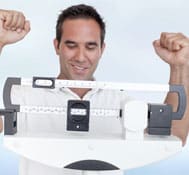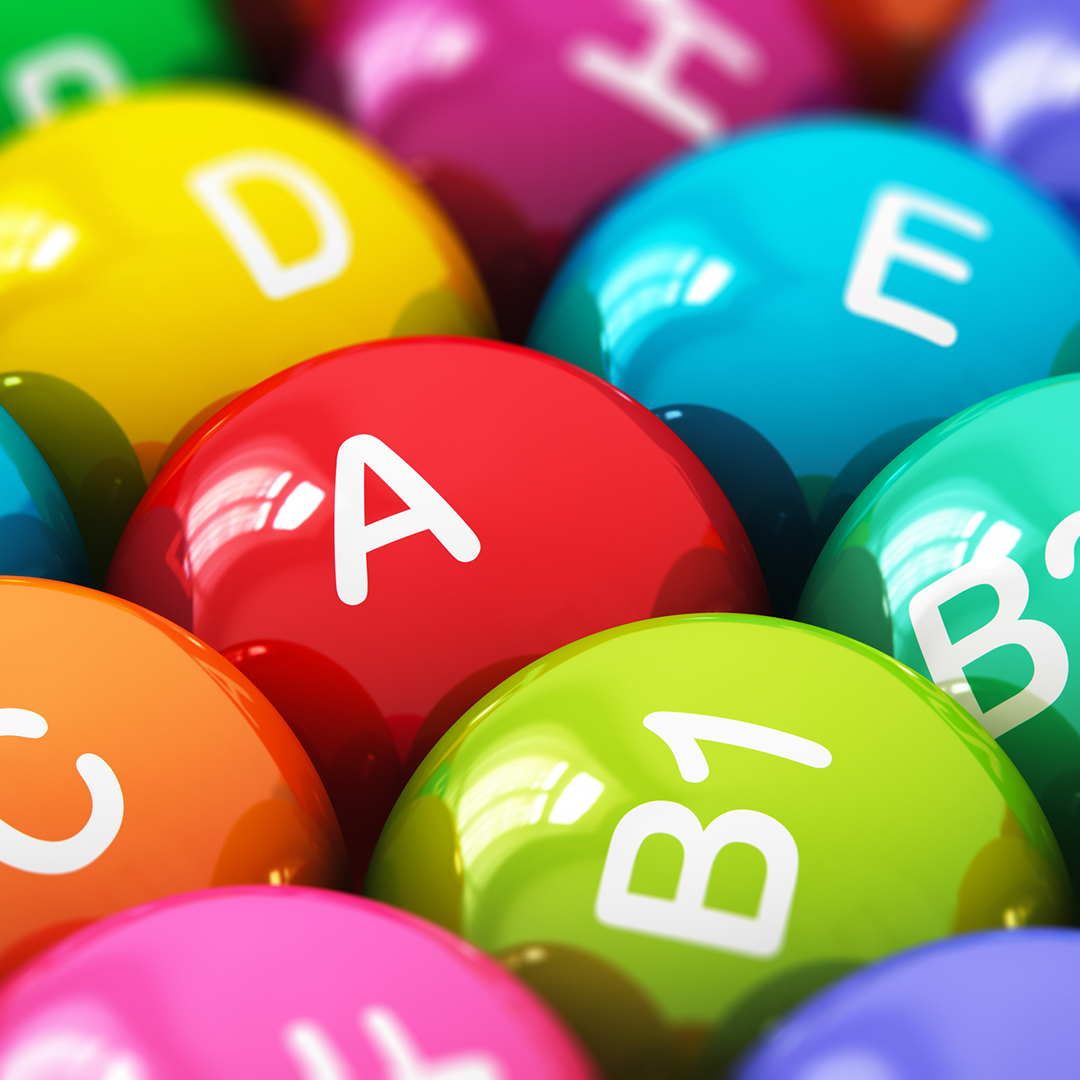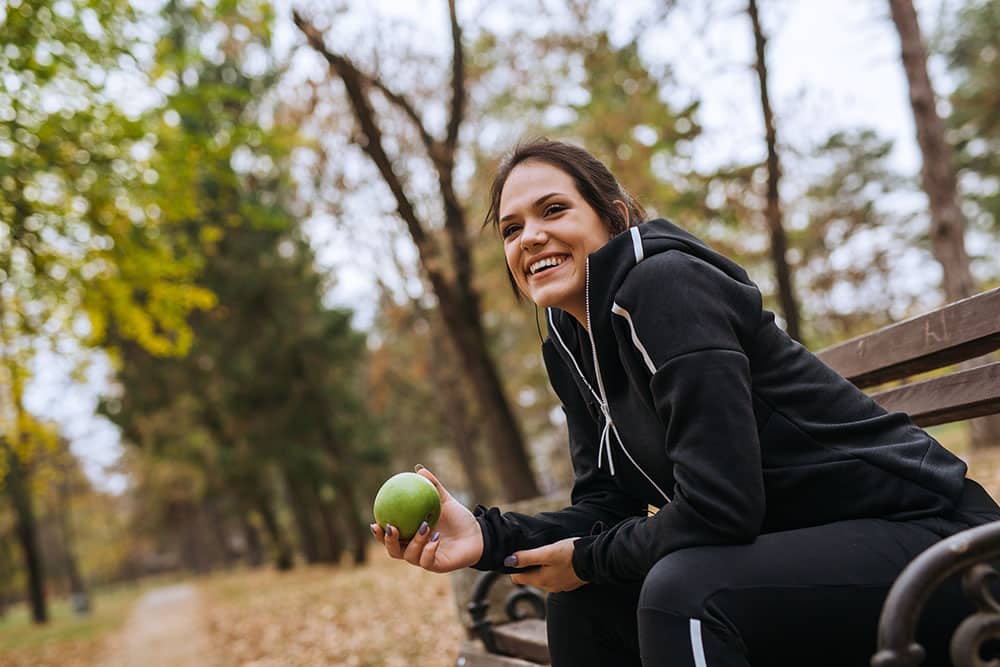We’re told from a very young age about the importance of vitamins and minerals and how we need a good amount of all the vitamins in our diet for our bodies to function optimally. But, do any of us understand what each vitamin does and how to get it into our systems?
Vitamin supplements are always an option and are often recommended by doctors to avoid deficiencies but for the majority of us, by eating a balanced diet we could actually get most of our vitamins that way – IF we know what we need to know about vitamins.
Here’s your guide to understanding what each vitamin does and what foods contain them:
Vitamin A
Vitamin A is actually also known as retinol and is used in the body for three main functions:
- Improving the strength of the immune system.
- Improving eyesight in low and dim lighting.
- Keeping skin and the lining of the body healthy.
Vitamin A is easy to include in your diet as it is found in staple foods such as cheese, eggs, oily fish, fortified low fat spreads and milk/yoghurt.
You can also add even more Vitamin A to your diet by eating foods that are rich in beta-carotene as the body changes this to Vitamin A during the digestive process.
Foods rich in beta-carotene include leafy vegetables and yellow fruits.
It is recommended that men consume 0.7mg of Vitamin A a day and women have 0.6mg and you should be able to get what you need through diet.
An over consumption of vitamin A can damage the bones over time, so please be aware.
Vitamin B
Vitamin B isn’t quite as straight forward as the others as there are many different types of Vitamin B including Vitamin B1, B2, B3, B6, B7, B12, pantothenic acid, folate and folic acid.
Each form of vitamin B is slightly unique but in general, all B vitamins help the release of energy from food and keep the nervous system healthy, as well as some of the vitamins helping to support skin and eye health, so they’re pretty important!
The different B vitamins can be found in various foods, but some vitamin B rich foods include eggs, meats like chicken, dairy products and vegetables.
The amount of vitamin B you need is broken down by each individual type and you need a different amount of each, so it’s fair to say that this vitamin is a little more complex to get the right amount of than others.
As we know how important vitamin B12 in particular is for mood and general health but also how easy it can be to not get enough of this particular vitamin, we’ve developed our own Bodyline B12 spray which can help ensure you get your daily allowance every day!
Vitamin C
Probably the vitamin most of us are most familiar with, vitamin C is the one we’re all pretty confident we know how to get into our systems.
Vitamin C’s main functions include helping to protect your cells and keep them healthy, maintaining healthy skin, blood vessels, bones and cartilage as well as helping with wound healing.
The best sources of vitamin c include oranges and orange juice, red and green peppers, strawberries and vegetables including broccoli, brussels sprouts and potatoes.
Our systems need a lot more vitamin C in comparison to other vitamins with adults aged between 19 – 64 needing 40mg a day. It is also worth knowing that the body does not store vitamin C and can only use what it is given, so you need to be getting this in your diet every day.
Vitamin D
Sometimes referred to as the ‘sunny vitamin’, most of us are also quite familiar with vitamin D and with the fact that we get it through sunlight.
The body creates vitamin D naturally when sunlight hits the skin which means during the months of April and September, most of us can get the vitamin D we need through just being outdoors but if you are indoors a lot and during the winter months, we need to add more vitamin D into our diets and sometimes use additional supplements
There are not very many foods that are considered reliable sources of vitamin D but these include oily fish, red meat, liver, egg yolks and foods specially fortified with it.
There’s a misconception that cow’s milk and dairy is a good source of vitamin D but as it isn’t fortified here in the UK, milk isn’t a good enough source to get your daily intake.
Children over the age of 1 and adults need just 10 milligrams of vitamin D which is a very small amount in comparison of other vitamins but due to the lack of sunshine here in the UK and the evidence that shows how few foods can actually provide enough vitamin D, a lot of us need to up our intake with the help of a supplement!
The Bodyline Vitamin D3 spray is a super easy way to make sure you’re getting the right amount of this vitamin and avoid the complications that can come with being deficient.
Vitamin E
A vitamin that is actually quite easy not to get enough of, especially considering the daily recommended amount, vitamin E helps to keep the skin and eyes healthy as well as supporting the body’s immune system.
Vitamin E is mainly found in plant oils such as soya, corn and olive oil, nuts and seeds and wheatgerm which is used to make cereals.
Men need 4mg of vitamin E a day while women need around 3mg, so ensuring a healthy number of nuts and seeds or oils are in your diet should ensure you get what you need through diet.
Vitamin K
A vitamin we don’t talk about very often, yet it is so essential to the functioning of our body, Vitamin K is used to help the blood in our bodies clot to aid wound healing.
Vitamin K is mainly found in leafy green vegetables, vegetable oils and cereal grains, however, small amounts are found in meat and dairy.
The amount of vitamin K required is dependent on your weight. An adult needs 1 microgram of vitamin K per KG of body weight, so an adult weighing 65kg would need 65 micrograms a day.
Most people get all the vitamin K they need through eating the right foods and the vitamin is stored in the liver for future use if the body gets too much in one day.
Calcium
A mineral we’re all familiar with and actually one of the most important ones for our bodies, calcium has many different functions in the body including helping build strong bones and teeth, regulating muscle contractions such as the heartbeat and making blood clot normally to support wound healing.
Calcium can actually be found in a lot of foods such as dairy (cows’ milk is a key source of calcium), green leafy vegetables, soya beans, tofu, nuts and even bread made with fortified flour.
Although adults aged between 19 – 64 need quite a lot of calcium per day, 700mg to be precise, you should be able to get the amount you need through diet.
Too much calcium, which is any more than 1500mg a day, can lead to stomach ache and abnormal bowel movement.
Iodine
The body needs a small amount of iodine to create and balance thyroid hormones which are what regulate metabolic rate.
The best sources of iodine are sea fish and shellfish and adults are recommended to consume around 0.14mg a day which should easily come from a balanced diet.
Iron
One of the minerals most of us know the most about, mainly due to the obvious signs of deficiency, iron is essential for making red blood cells which carry oxygen around the body.
A deficiency in iron is known as anaemia which can lead to dizziness and a lack of energy.
For people without anaemia, you should be able to get all the iron you need through diet and it is found in foods such as liver, red meats, beans, nuts, dried fruits, whole grains and dark leafy green vegetables such as watercress and curly kale. Don’t forget though, eating liver is not recommended during pregnancy.
Men need dramatically less iron than women; men over the age of 18 need 8.7mg a day whilst women aged between 19 and 50 need 14.8mg a day, which lowers to 8.7mg over the age of 50. Women’s iron needs are higher due to menstruation and the loss of blood this causes.
Consuming too much iron is actually really dangerous and having more than 20mg a day can lead to problems such as sickness, constipation and stomach pain.
Others
As well as the key minerals and vitamins mentioned above, many of which we’re all familiar with, there’s a whole host of other minerals the body needs to work at optimum, these include:
- Beta-carotene
- Chromium
- Cobalt
- Copper
- Magnesium
- Manganese
- Molybdenum
- Phosphorus
- Potassium
- Selenium
- Sodium chloride (salt)
- Zinc
Having a good amount of green leafy vegetables, a mixture of meat and fishes and nuts in your diet should ensure you get the right amount of all the above just through your diet.
So, that’s the low down on all the vitamins and minerals our body needs and as you’ll have seen, it is possible to get what you need through diet but if you have dietary requirements or a lifestyle that means you think you may be deficient, do go and see your GP as a supplement may be required.
*information sourced from the NHS website to ensure optimum accuracy.















